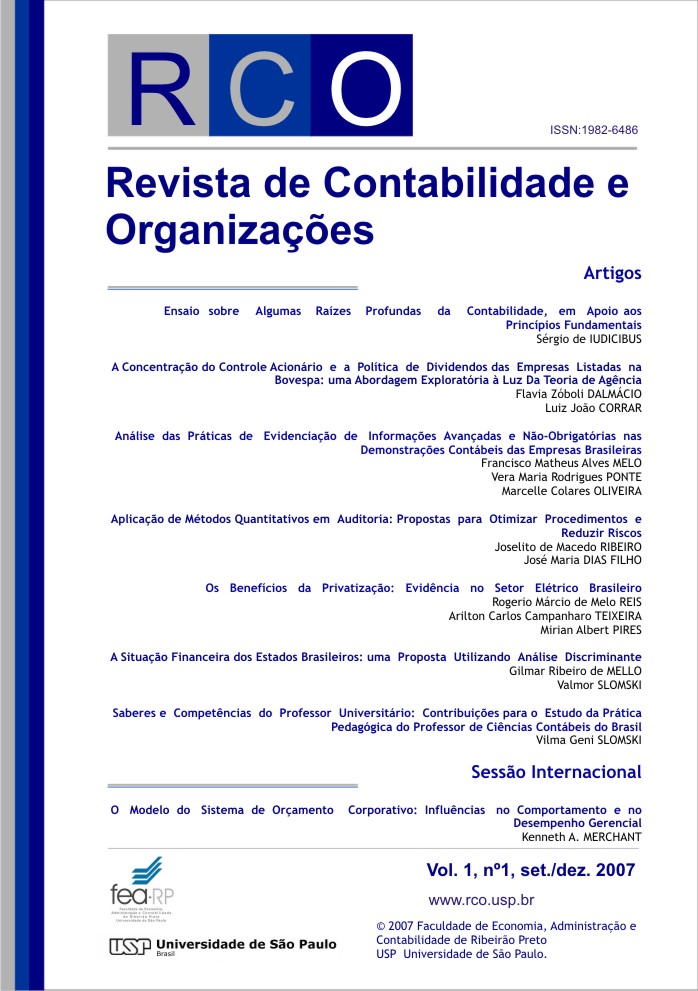PRIVATIZATION BENEFITS: EVIDENCES ON BRAZILIAN ELECTRIC SECTOR
DOI:
https://doi.org/10.11606/rco.v1i1.34697Keywords:
privatization, quality indicators, denationalization, electric sectorAbstract
This paper has as an objective to empirically examine the behavior of indicators related to the quality of the electrical energy provided to the consumers of privatized distribution Brazilian companies as consequence of the National Denationalization Program [Programa Nacional de Desestatização - PND]. The quality indicators studied were: the Interruption Equivalent Duration per Consumer Unity [Duração Equivalente de Interrupção por Unidade Consumidora - DEC] and the Interruption Equivalent Frequency per Consumer Unity [Freqüência Equivalente de Interrupção por Unidade Consumidora - FEC]. It was made a revision of the bibliography about the social political situation of the period before the privatization, as a way of contextualizing. On methodology, there had been used bibliographic, documental and ex post facto research. The study utilized the T-test: two paired samples for average as test for averages equality hypothesis. From de analysis, it is inferred that the DEC and FEC averages are not equal and the DEC and FEC averages before the privatization are bigger than their averages after the privatization, which indicates an improvement on the quality of the service of electrical energy distribution provided to consumers by privatized enterprises.Downloads
Downloads
Published
Issue
Section
License
The RCO adopts the Free Open Access policy, under the standard Creative Commons agreement (CC BY-NC-ND 4.0). The agreement provides that:
- Submission of text authorizes its publication and implies commitment that the same material is not being submitted to another journal. The original is considered definitive.
- Authors retain the copyright and grant the journal the right of first publication, with the work simultaneously licensed under the Creative Commons Attribution License which allows the sharing of the work with acknowledgment of authorship and initial publication in this journal.
- Authors are authorized to take additional contracts separately, for non-exclusive distribution of the version of the work published in this journal (e.g. publish in an institutional repository or as a book chapter), with necessary recognition of authorship and initial publication in this journal.
- Authors are allowed and encouraged to publish and distribute their work online (e.g. in institutional repositories or on their personal page) before or during the editorial process, as this can generate productive changes as well as increase the impact and citation of published work (See The Effect of Free Access).
- The journal does not pay copyright to the authors of the published texts.
- The journal's copyright holder, except those already agreed in the Free Open Access Agreement (CC BY-NC-ND 4.0), is the Accounting Department of the Faculty of Economics, Administration and Accounting of Ribeirão Preto of the University of São Paulo.
No submission or publication fees are charged.
Up to 4 authors per article are accepted. Exceptionally duly justified cases may be reviewed by the Executive Committee of the RCO. Exceptional cases are considered as: multi-institutional projects; manuscripts resulting from the collaboration of research groups; or involving large teams for evidence collection, construction of primary data, and comparative experiments.
It is recommended that the authorship be ordered by contribution of each of the individuals listed as authors, especially in the design and planning of the research project, in obtaining or analyzing and interpreting data, and writing. Authors must declare the actual contributions of each author, filling the letter to the editor, at the beginning of the submission, taking responsibility for the information given.
Authors are allowed to change throughout the evaluation process and prior to the publication of the manuscript. The Authors should indicate the composition and final order of authorship in the document signed by all those involved when accepted for publication. If the composition and authoring order is different than previously reported in the system, all previously listed authors should be in agreement.
In the case of identification of authorship without merit or contribution (ghost, guest or gift authorship), the RCO follows the procedure recommended by COPE.








